沪版牛津英语六年级上知识点整理
沪教牛津英语六年级上册冠词汇总

沪教牛津英语六年级上册冠词汇总
冠词是英语中的一类常见的词汇,包括不定冠词(a/an)和定冠词(the)。
在沪教牛津英语六年级上册中,学生将研究有关冠词的基本知识和用法。
下面是该册课本中的冠词汇总:
不定冠词(a/an):
1. 不定冠词用于泛指单数可数名词前,表示某物的一个。
例如:I have a book.(我有一本书。
)
2. 不定冠词用于表示职业或身份的名词前。
例如:She wants to be a teacher.(她想成为一名教师。
)
3. 不定冠词用于表示数量的名词前。
例如:We need a few pencils.(我们需要几支铅笔。
)
定冠词(the):
1. 定冠词用于特指的名词前,表示某个具体的人、物或事物。
例如:The boy is playing football.(那个男孩正在踢足球。
)
2. 定冠词用于表示独一无二的事物或事物在前面被提及过的名词前。
例如:I saw a cat. The cat was black.(我看到一只猫。
那只猫是黑色的。
)
3. 定冠词还可用于表示乐器、方位、方向、时间等特定的名词前。
例如:She plays the piano very well.(她钢琴弹得很好。
)
以上是沪教牛津英语六年级上册中关于冠词的基本知识和用法的汇总。
掌握了这些内容,学生们将能够正确地运用冠词,使自己的英语表达更加准确和流畅。
牛津沪教版英语六年上Unit 4 What would you like to be复习
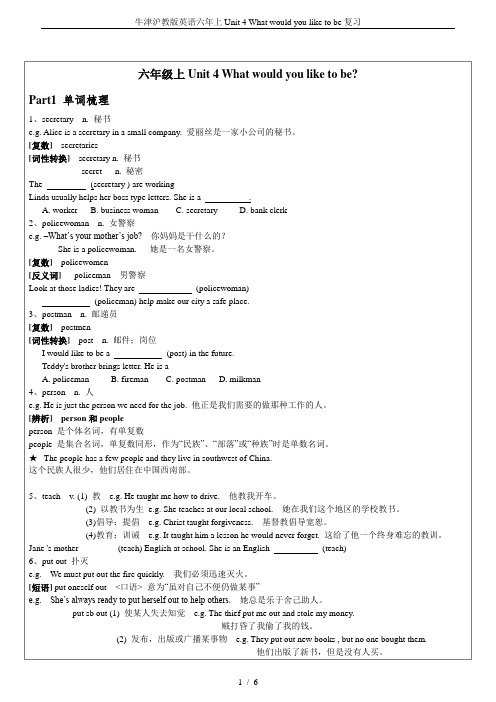
6.――Chongming Island?
――Yes,I have alreadythere.
A. Have you been to,beenB. Have you been to,been to
C. Will you go to,beenD. Are you going to,been to
find表示“找到”,“偶然发现”或“发觉”;而find out表示“想方设法调查清楚”或“弄明白”一件事情的真相。
[对应练习]
Kitty wants toif Tom likes his job.
A.find B.look for C.find out D.look out
9、if conj. (1)是否e.g. He couldn’t tell if she was laughing.他弄不清楚她是否在笑。
7. Would you like _______ (have ) a rest?
8. Thursday is the _____(five) day in a week.
9.I’m a primary school student.I’m ________,and my Dad is _______ (four)
put sb out (1)使某人失去知觉e.g. The thief put me out and stole my money.
贼打昏了我偷了我的钱。
(2)发布,出版或广播某事物e.g. They put out new books , but no one bought them.
他们出版了新书,但是没有人买。
我已经获得了全国化学制品公司的邀约面试。
牛津英语(上海版)6年级上学期知识点罗列(1).doc

牛津英语(上海版)6年级上学期知识点罗列(1)1. family 表示家庭的时候,它是单数名词表示家庭成员的时候,它是复数名词Tom’s family is a happy one. 家庭The Wang’s family go to America every year. 家庭成员FAMILY: F ather a nd m other I l ove y ou.2. grandfather 爷爷great-grandfather 曾祖父granddaughter 孙女great-granddaughter 曾孙女3. classmate 同学deskmate 同桌workmate 同事roommate 室友schoolmate 校友4. get sth. from sb. 从某人那里得到某物He doesn’t get any money from his parents.5. 频度副词always, usually, often, sometimes, seldom, never频度副词的位置:放在行为动词之前,be动词之后I sometimes watch TV with my grandmother.He is always late for school.6. What else do you do with her?What else 还有什么Who else will he meet? 他还要见谁?Where else will you go?---- else 用于特殊疑问词之后Anything else? 还有什么东西么?Anyone else? 还有谁么?1. exciting 令人兴奋的,使人激动的---通常修饰事物excited 感到兴奋的,感到激动的---通常修饰人interesting – interestedboring – bored 无聊的surprising – surprised 惊奇的2. who 主格whom 宾格whose 所有格My grandparents usually go to see a film with my mother. 对划线部分提问Who/Whom do your grandparents usually go to see a film with?3. Watching TV is one of the most important activities of the day.动名词短语做主语。
上海牛津版六年级上Unit 1知识梳理

1 / 14Unit 1 Family and relatives重点1. 掌握使用指示代词指代人。
These are my family and relatives. This is my grandfather.2. always, usually, sometimes 表示动作发生频率的副词,常放在行为动词前。
We always have dinner together. I usually walk to school.知识清单知识网络2 / 14We sometimes go swimming at the weekend. 3. go shopping 去购物,去买东西Alice and Betty often go shopping on Sundays.go+现在分词(v + ing )组成的词组表示“去(干……) go cycling ,go swimming ,go fishing难点1. The simple present tense 一般现在时,尤其第三人称的变化和使用。
2. 掌握并应用以下重点词汇及短语What else….?/only/family and relatives/a family tree/grandsons and granddaughters/family members/with sb.易错点1. 一般现在时(尤其第三人称)否定及疑问的变化。
高频考点1. have 的否定句和疑问句结构。
2. always 频度副词。
3. go doing 表示进行某项活动。
牛津词汇relative n.亲戚;亲属shop v.购物family tree 家谱go shopping 去购物granddaughter n.孙女;外孙女else adv.别的;其他的grandson n.孙子;外孙*badminton n.羽毛球only adv.仅仅cycle v.骑自行车member n.成员;会员go cycling 去骑自行车*classmate n.同班同学知识梳理第一部分:词汇精讲1. relative n.亲戚;亲属Do you have any relatives in Shanghai? 你在上海有亲戚吗?【联想】family tree家谱,family member 家庭成员【头脑风暴】granddaughter n.孙女;外孙女great-granddaughter n.曾孙女;曾外孙女grandson n.孙子;外孙great-grandson n.曾孙子;曾外孙grandfather n.祖父;外祖父grandmother n.祖母;外祖母3 / 14uncle n.叔叔,舅舅,姑父,叔父aunt n.阿姨,姑姑,舅母,婶婶sister n.姐,妹brother n.兄,弟cousin n.堂/表兄弟姐妹2. only adv. 仅仅only常常用于表示限定。
牛津上海六年级英语知识点
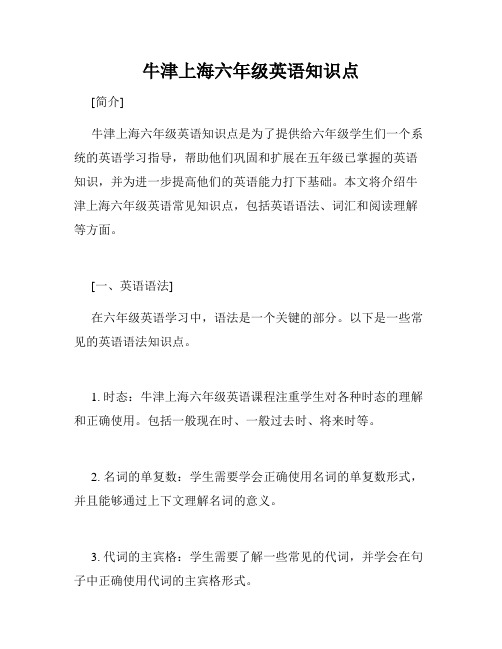
牛津上海六年级英语知识点[简介]牛津上海六年级英语知识点是为了提供给六年级学生们一个系统的英语学习指导,帮助他们巩固和扩展在五年级已掌握的英语知识,并为进一步提高他们的英语能力打下基础。
本文将介绍牛津上海六年级英语常见知识点,包括英语语法、词汇和阅读理解等方面。
[一、英语语法]在六年级英语学习中,语法是一个关键的部分。
以下是一些常见的英语语法知识点。
1. 时态:牛津上海六年级英语课程注重学生对各种时态的理解和正确使用。
包括一般现在时、一般过去时、将来时等。
2. 名词的单复数:学生需要学会正确使用名词的单复数形式,并且能够通过上下文理解名词的意义。
3. 代词的主宾格:学生需要了解一些常见的代词,并学会在句子中正确使用代词的主宾格形式。
4. 形容词和副词的比较级和最高级:学生需要学习形容词和副词的比较级和最高级形式,并能够正确运用于句子中。
5. 动词的不定式和动名词:学生需要学会区分动词的不定式和动名词形式,并且能够根据上下文理解其使用方式。
[二、英语词汇]在六年级英语学习中,词汇的掌握是非常重要的。
以下是一些常见的英语词汇知识点。
1. 基础词汇:学生需要熟练掌握一些常见的英语单词,包括表示人物、动物、食物等方面的词汇。
2. 时钟时间:学生需要学会用英语表达时间,并且能够读懂时钟上的时间。
3. 季节和月份:学生需要学会用英语表达四季和十二个月份,并且能够通过上下文理解相关的词汇。
4. 数字和计数:学生需要学会用英语表达数字,并且能够正确计数。
5. 学科词汇:学生需要学会一些与学科相关的词汇,比如数学、科学、地理等。
[三、阅读理解]在六年级英语学习中,阅读理解是培养学生阅读能力和理解能力的重要环节。
以下是一些常见的阅读理解知识点。
1. 阅读短文:学生需要学会阅读简短的英语短文,并且能够通过阅读内容回答问题。
2. 理解问题:学生需要根据短文内容,理解问题的意思,并能够准确回答问题。
3. 推理判断:学生需要通过上下文理解短文中的隐含信息,并能够进行推理判断。
牛津英语(上海版)6年级上学期知识点罗列(1)
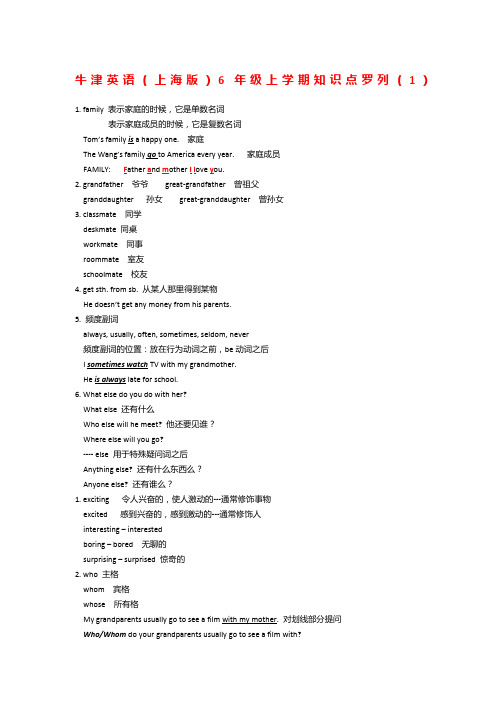
牛津英语(上海版)6年级上学期知识点罗列(1)1. family 表示家庭的时候,它是单数名词表示家庭成员的时候,它是复数名词Tom’s family is a happy one. 家庭The Wang’s family go to America every year. 家庭成员FAMILY: F ather a nd m other I l ove y ou.2. grandfather 爷爷great-grandfather 曾祖父granddaughter 孙女great-granddaughter 曾孙女3. classmate 同学deskmate 同桌workmate 同事roommate 室友schoolmate 校友4. get sth. from sb. 从某人那里得到某物He doesn’t get any money from his parents.5. 频度副词always, usually, often, sometimes, seldom, never频度副词的位置:放在行为动词之前,be动词之后I sometimes watch TV with my grandmother.He is always late for school.6. What else do you do with her?What else 还有什么Who else will he meet? 他还要见谁?Where else will you go?---- else 用于特殊疑问词之后Anything else? 还有什么东西么?Anyone else? 还有谁么?1. exciting 令人兴奋的,使人激动的---通常修饰事物excited 感到兴奋的,感到激动的---通常修饰人interesting – interestedboring – bored 无聊的surprising – surprised 惊奇的2. who 主格whom 宾格whose 所有格My grandparents usually go to see a film with my mother. 对划线部分提问Who/Whom do your grandparents usually go to see a film with?3. Watching TV is one of the most important activities of the day.动名词短语做主语。
上海牛津英语六年级(预初)英语知识点整理(一)
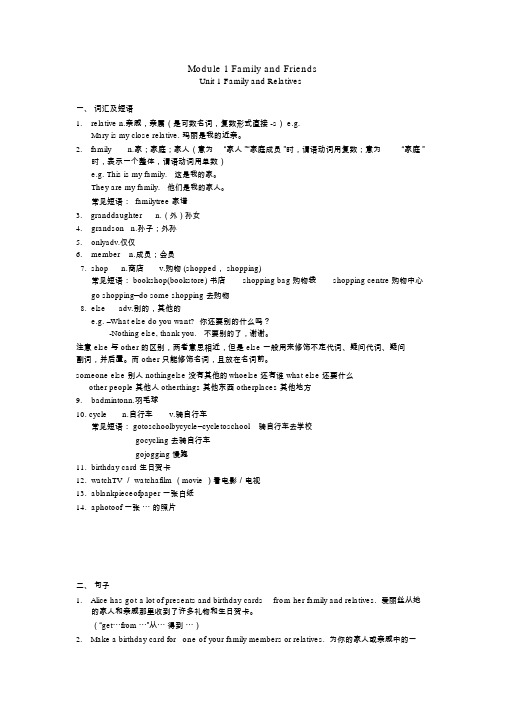
Module 1 Family and FriendsUnit 1 Family and Relatives一、词汇及短语1.relative n.亲戚,亲属(是可数名词,复数形式直接 -s) e.g.Mary is my close relative. 玛丽是我的近亲。
2. family n.家;家庭;家人(意为“家人”“家庭成员”时,谓语动词用复数;意为“家庭”时,表示一个整体,谓语动词用单数)e.g. This is my family.这是我的家。
They are my family.他们是我的家人。
常见短语: familytree 家谱3. granddaughter n.(外)孙女4.grandson n.孙子;外孙5.only adv.仅仅6.member n.成员;会员7.shop n.商店v.购物 (shopped, shopping)常见短语: bookshop(bookstore) 书店shopping bag 购物袋shopping centre 购物中心go shopping=do some shopping 去购物8.else adv.别的,其他的e.g. –What else do you want? 你还要别的什么吗?-Nothing else, thank you.不要别的了,谢谢。
注意 else 与 other 的区别,两者意思相近,但是 else 一般用来修饰不定代词、疑问代词、疑问副词,并后置。
而 other 只能修饰名词,且放在名词前。
someone else 别人 nothingelse 没有其他的whoelse 还有谁 what else 还要什么other people 其他人 otherthings 其他东西 otherplaces 其他地方9.badmintonn.羽毛球10. cycle n.自行车v.骑自行车常见短语: gotoschoolbycycle=cycletoschool骑自行车去学校gocycling 去骑自行车gojogging 慢跑11.birthday card 生日贺卡12.watchTV / watchafilm (movie )看电影/电视13.ablankpieceofpaper 一张白纸14.aphotoof 一张⋯的照片二、句子1. Alice has got a lot of presents and birthday cards from her family and relatives.爱丽丝从她的家人和亲戚那里收到了许多礼物和生日贺卡。
上海版牛津英语6A知识点整理
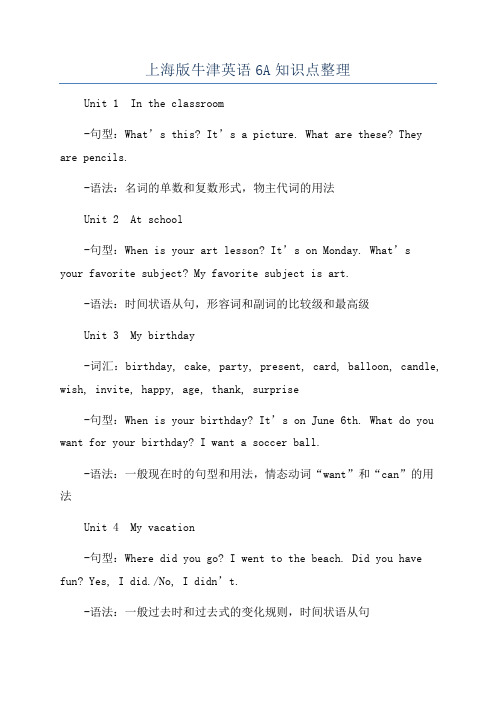
上海版牛津英语6A知识点整理Unit 1 In the classroom-句型:What’s this? It’s a picture. What are these? They are pencils.-语法:名词的单数和复数形式,物主代词的用法Unit 2 At school-句型:When is your art lesson? It’s on Monday. What’syour favorite subject? My favorite subject is art.-语法:时间状语从句,形容词和副词的比较级和最高级Unit 3 My birthday-词汇:birthday, cake, party, present, card, balloon, candle, wish, invite, happy, age, thank, surprise-句型:When is your birthday? It’s on June 6th. What do you want for your birthday? I want a soccer ball.-语法:一般现在时的句型和用法,情态动词“want”和“can”的用法Unit 4 My vacation-句型:Where did you go? I went to the beach. Did you have fun? Yes, I did./No, I didn’t.-语法:一般过去时和过去式的变化规则,时间状语从句Unit 5 Animals and plants-词汇:animal, plant, kangaroo, elephant, lion, tiger, monkey, panda, parrot, snake, butterfly, grass, flower, tree, forest-句型:What can parrots do? They can fly and talk. What are pandas’ favorite food? Their favorite food is bamboo.-语法:情态动词“can”的用法,描述事物的特征和能力Unit 6 In the garden-词汇:garden, vegetable, tomato, carrot, radish, onion, potato, cucumber, cabbage, turnip-句型:What can you see in the garden? I can see tomatoes, carrots, and onions. What’s your favorite vegetable? My favorite vegetable is cucumber.-语法:复数形式的可数名词Unit 7 We’re going to the zoo-词汇:zoo, lion, panda, monkey, kangaroo, tiger, bear, elephant, snake, ostrich, tortoise-句型:What are you going to do? We’re going to the zoo. Can snakes fly? No, they can’t.-语法:be going to表示将来的句型和用法,否定词can’t的用法Unit 8 On the farm-词汇:farm, pig, horse, sheep, chicken, cow, duck, dog, cat, lamb, chick, puppy, kitten-句型:How many pigs are there? There are three pigs.What’s your favorite farm animal? My favorite farm animal is a horse.-语法:数词和名词的复数形式Unit 9 At the supermarket-词汇:supermarket, mall, shop, store, grocery, bread, egg, cheese, juice, milk, butter, tea, coffee, sugar, salt-句型:What do you want to buy? I want to buy some bread. How much is the milk? It’s twenty yuan.-语法:不可数名词的用法,询问物品价格的句型和用法Unit 10 Clothes-词汇:clothes, hat, shirt, T-shirt, dress, skirt, pants, shorts, socks, shoes, coat, gloves, watch, scarf-句型:What are you wearing? I am wearing a hat, a T-shirt, and shorts. How much are the shoes? They are fifty yuan.-语法:指示代词和指示形容词,描述衣物的材料和颜色Unit 11 Our body-词汇:body, head, face, hair, eye, nose, mouth, ear, hand, arm, leg, foot, finger, toe-句型:What can you do with your hands? I can write and draw with my hands. How many fingers do you have? I have ten fingers.-语法:名词所有格的用法,询问数量和回答数量的句型以上是上海版牛津英语6A教材中的部分重要知识点的整理。
- 1、下载文档前请自行甄别文档内容的完整性,平台不提供额外的编辑、内容补充、找答案等附加服务。
- 2、"仅部分预览"的文档,不可在线预览部分如存在完整性等问题,可反馈申请退款(可完整预览的文档不适用该条件!)。
- 3、如文档侵犯您的权益,请联系客服反馈,我们会尽快为您处理(人工客服工作时间:9:00-18:30)。
Module1FamilyandfriendsUnit1Familyandrelatives1.familyandrelatives家庭和亲戚2.afamilytree一个家谱3.grandsonsandgranddaughters孙子和孙女们/外孙和外孙女们4.getalotofpresents得到许多礼物5.HappyBirthday(tosb.)!生日快乐!6.getabirthdaycardfromsb.从某人那儿得到一张生日卡7.oneofmyfamilymembers我的家庭成员之一8.onlyhaveoneaunt仅仅有一个阿姨9.myclassmates我的同班同学10.goshopping去购物11.whatelse其他什么12.playbadminton打羽毛球13.gocycling去骑自行车14.goswimming去游泳15.twocousins两个堂/表兄弟/妹16.howmany+名词复数多少……语言点1.Thisismygrandfather.这是我的(外)祖父。
Thesearemyfamilyandrelatives.这些是我的家人和亲戚。
注意句中各成分保持单复数同形。
2.Imtheirson..我是他们的儿子。
Weretheirsons.我们是他们的儿子。
3.Howmanyunclesdoyouhave你有多少个叔叔?Howmany后面接可数名词的复数形式。
4.Whatdoyoudowithyour…你和你的…干什么?5.Whatelsedoyoudowithyour…你和你的…还干什么?6.Whatelsedoyoudowithyour…你和你的…还干什么?With是个介词,后面接人称代词时,要用宾格的形式。
Withme/him/her/it/us/them7.always/sometimes/usually是频度副词,提问应该要用Howoften…Unit2Ihaveagoodfriend1.helpeachother互相帮助2.helpotherpeople=helpothers帮助别人3.not…atall根本不4.gooutatnight在晚上出去5.liketobetogether喜欢在一起6.walktoschooltogether一起走去学校7.befriendly友好的8.behelpful有帮助的9.workhard=studyhard努力学习10.belateforschool上学迟到11.getangry变得生气12.bekindtoothers对别人友善的13.sharesth.withsb.和某人分享某物14.benevernaughty从不淘气15.nevertellalie/lies从不说谎16.avisittosp.一次去某地的参观17.liveintheUSA=liveinAmerica居住在美国18.visitsp.forthefirsttime第一次参观某地19.asksb.aboutsth.询问某人关于某事20.have/hasbeentosp.曾去过某地21.OceanPark海洋公园22.GardenCityZoo花园城市公园23.WaterWorld水上世界24.FriendsoftheEarth地球的朋友25.lookafter=takecareof照顾,照看26.lookaftertheenvironment照顾环境27.allthethingsroundus我们周围所有的东西28.pollutetheair污染空气29.airpollution空气污染30.waterpollution水污染ndpollution陆地污染32.keepsth.clean保持某物干净33.pickup捡起,拾起34.putrubbishintorubbishbins把垃圾放入垃圾箱35.tellsb.todosth.告诉某人做某事36.tellsb.nottodosth.告诉某人不要做某事37.leaverubbish留下垃圾38.wanttobe/become想要成为39.wanttodosth.想要做某事40.promisetodosth.承诺做某事41.promisenottodosth.承诺不要做某事42.ourpromises我们的承诺43.discusssth.withsb.和某人讨论某事44.reuseshoppingbags再使用购物袋45.Whata bout/Howaboutsth./doing………怎么样?语言点:1.always/sometimes/usually/never是频度副词.在句中的位置是:放在行为动词的前面,放在be动词的后面。
也可以说“行前系后”。
Sheisalwayskind.她总是很善良的。
Shealwayshelpsotherpeople.她总是帮助其他人。
不能出现这样的句子:Sheisalwayshelpsotherpeople.(×)一句话中不能同时出现两个动词。
并且要注意主谓保持一致,尤其注意第三人称单数不可以忽略。
2.Theyliketobetogether.他们喜欢在一起。
liketodosth.=likedoingsth.喜欢做某事Helikestoplayfootball.=Helikesplayingfootball.他喜欢踢足球。
3.Shecantreadorwrite.她既不会读也不会写。
or用在否定句中表平列关系。
and用在肯定句中表平列关系。
Shecanreadandwrite.她既会读又会写。
4.helpeachother互相帮助5.otherpeople=others其他人6.bekindtosb.对某人很友好7.tellalie=telllies说谎8.sharesth.withsb.和某人分享某物Shesharesherbreadwithme.她把她的面包分给了我。
9.intheUSA在美国USA要大写。
10.forthefirsttime第一次11.onSaturday具体的某一天介词用on12.Haveyoubeento…..yet你去过…..吗?Yes,Ihave already/justbeento…./beenthere.是的,我已经去过了。
No,Ihaventbeento…/beenthereyet.不,还没有去过。
already/just用于肯定句中。
yet用于否定和疑问句中。
Unit3Spendingadayouttogether1.spendadayouttogether一起在外度过一天2.onGreenIsland在绿岛上3.inHappyTown在快乐城4.inDragonBay在龙湾5.onLuckyIsland在幸运岛上6.atweekends=attheweekend在周末7.benearsp.离开某地近的8.befar(away)fromsp离开某地远的9.SeasideTown海边镇10.aphotoofmyfamilyandme一张我家人和我的照片11.havelunchtogether一起吃午饭12.GreenMarket格林市场13.InSunnyTown在太阳城14.SpaceMuseum太空博物馆15.InMoonTown在月亮城16.anactivity一项活动17.haveabarbecue进行一次烧烤18.flykites放风筝19.ridebicycles骑自行车20.makesandcastles筑沙堡21.collectshells收集贝壳22.makeanalbum制作一本照片簿23.plantodosth.计划做某事24.agoodidea一个好主意25.whichplace哪一个地方26.planatrip计划一次旅行27.Howabout………怎么样?(常用于表示建议或提议)28.begoingto+v.打算做…语言点:1.atweekends=attheweekend在周末2.near/farawayfrom离….近/远near后直接接地点名词3.Wherehaveyoubeenin….你去了….哪个地方?Ihavebeento….in/on…我去了….WherehaveyoubeeninShanghai你到过上海哪里?IhavebeentoCenturyParkinShanghai.我到过上海的世纪公园。
6.aphotoofmybrotherandme一张我哥和我的照片。
aphotoof后接人称代词时,应该用宾格形式aphotoofme/him/her/it/us/them7.be+V-ing表现在进行时8.cost以物作主语,通常是问价钱Take以it作主语。
通常是花费时间Ittakesme15minutestogotoschool.Spend以人作主语,既可以是花费金钱,也可以是花费时间。
Spendtime/moneyonsth.spendtime/moneyindoingsth.Ispendtwoyuanonthispen.=Ispendtw oyuaninbuyingthispen.9.Whichplaceshallwevisit我们将参加哪个地方?10.Whenarewegoingtocomeback我们将什么时候回来?Comeback回来Begoingto表将来begoingto=will11.Howarewegoingtogetthere我们将怎样到达哪里?How对交通工具进行提问。
回答可以用bybus/car…/onfoot12.Howmuchdoesitcost它花费多少钱?Howmuch对价钱提问13.Howabout=whatabout怎么样?14.a.m./p.m.分别表示上午和下午。
Module2PlacesandactivitiesUnit4Whatwouldyouliketobe1.differentjobs不同的职业2.wouldliketobe/become想要成为……3.asecretary一名秘书4.abankclerk一个银行职员5.apolicewoman一个女警察6.adentist一名牙医7.apilot一名飞行员8.afireman一个消防队员9.apostman一名邮递员10.ashopassistant一个商店营业员11.teachchildrenEnglish教孩子们英语12.makesickpeoplebetter使病人好转13.driveabus驾驶一辆公交车14.putoutfires扑灭火15.cookfoodforpeople为人们烧食物16.makeourcityasafeplace使我们的城市(成为)一个安全的地方17.interviewsb.采访某人18.findout查明;弄清(情况)19.starkwork开始工作20.finishwork结束工作21.inthemorning/afternoon/evening在早上/下午/晚上22.Whynot为什么不呢?语言点:1.wouldliketodosth.想要做某事2.Wouldyouliketobea/an…你想要成为一个….Yes,Iwould./No,Iwouldnt.是的,我想。
